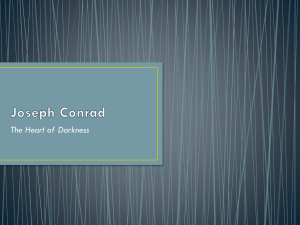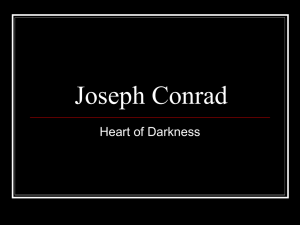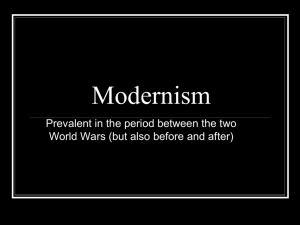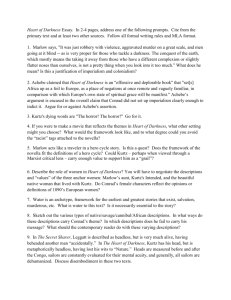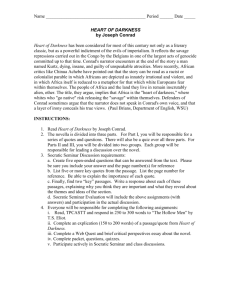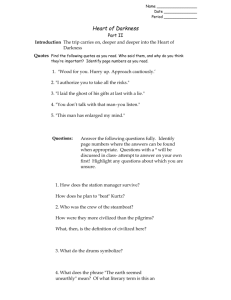Close Reading – Section 3
advertisement
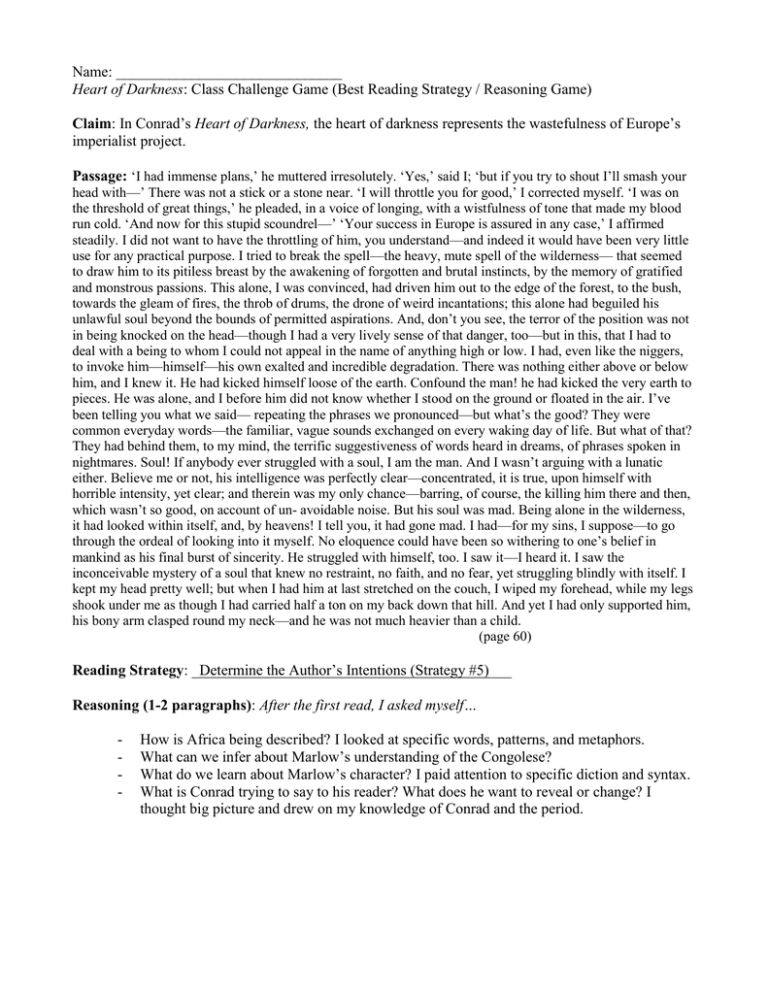
Name: ______________________________ Heart of Darkness: Class Challenge Game (Best Reading Strategy / Reasoning Game) Claim: In Conrad’s Heart of Darkness, the heart of darkness represents the wastefulness of Europe’s imperialist project. Passage: ‘I had immense plans,’ he muttered irresolutely. ‘Yes,’ said I; ‘but if you try to shout I’ll smash your head with—’ There was not a stick or a stone near. ‘I will throttle you for good,’ I corrected myself. ‘I was on the threshold of great things,’ he pleaded, in a voice of longing, with a wistfulness of tone that made my blood run cold. ‘And now for this stupid scoundrel—’ ‘Your success in Europe is assured in any case,’ I affirmed steadily. I did not want to have the throttling of him, you understand—and indeed it would have been very little use for any practical purpose. I tried to break the spell—the heavy, mute spell of the wilderness— that seemed to draw him to its pitiless breast by the awakening of forgotten and brutal instincts, by the memory of gratified and monstrous passions. This alone, I was convinced, had driven him out to the edge of the forest, to the bush, towards the gleam of fires, the throb of drums, the drone of weird incantations; this alone had beguiled his unlawful soul beyond the bounds of permitted aspirations. And, don’t you see, the terror of the position was not in being knocked on the head—though I had a very lively sense of that danger, too—but in this, that I had to deal with a being to whom I could not appeal in the name of anything high or low. I had, even like the niggers, to invoke him—himself—his own exalted and incredible degradation. There was nothing either above or below him, and I knew it. He had kicked himself loose of the earth. Confound the man! he had kicked the very earth to pieces. He was alone, and I before him did not know whether I stood on the ground or floated in the air. I’ve been telling you what we said— repeating the phrases we pronounced—but what’s the good? They were common everyday words—the familiar, vague sounds exchanged on every waking day of life. But what of that? They had behind them, to my mind, the terrific suggestiveness of words heard in dreams, of phrases spoken in nightmares. Soul! If anybody ever struggled with a soul, I am the man. And I wasn’t arguing with a lunatic either. Believe me or not, his intelligence was perfectly clear—concentrated, it is true, upon himself with horrible intensity, yet clear; and therein was my only chance—barring, of course, the killing him there and then, which wasn’t so good, on account of un- avoidable noise. But his soul was mad. Being alone in the wilderness, it had looked within itself, and, by heavens! I tell you, it had gone mad. I had—for my sins, I suppose—to go through the ordeal of looking into it myself. No eloquence could have been so withering to one’s belief in mankind as his final burst of sincerity. He struggled with himself, too. I saw it—I heard it. I saw the inconceivable mystery of a soul that knew no restraint, no faith, and no fear, yet struggling blindly with itself. I kept my head pretty well; but when I had him at last stretched on the couch, I wiped my forehead, while my legs shook under me as though I had carried half a ton on my back down that hill. And yet I had only supported him, his bony arm clasped round my neck—and he was not much heavier than a child. (page 60) Reading Strategy: _Determine the Author’s Intentions (Strategy #5)___ Reasoning (1-2 paragraphs): After the first read, I asked myself… - How is Africa being described? I looked at specific words, patterns, and metaphors. What can we infer about Marlow’s understanding of the Congolese? What do we learn about Marlow’s character? I paid attention to specific diction and syntax. What is Conrad trying to say to his reader? What does he want to reveal or change? I thought big picture and drew on my knowledge of Conrad and the period. Claim: In Conrad’s Heart of Darkness, the heart of darkness represents Marlow’s discomfort with Africa. Passage: ‘His was an impenetrable darkness. I looked at him as you peer down at a man who is lying at the bottom of a precipice where the sun never shines. But I had not much time to give him, because I was helping the engine-driver to take to pieces the leaky cylinders, to straighten a bent connect- ing-rod, and in other such matters. I lived in an infernal mess of rust, filings, nuts, bolts, spanners, hammers, ratch- et-drills—things I abominate, because I don’t get on with them. I tended the little forge we fortunately had aboard; I toiled wearily in a wretched scrap-heap—unless I had the shakes too bad to stand. ‘One evening coming in with a candle I was startled to hear him say a little tremulously, ‘I am lying here in the dark waiting for death.’ The light was within a foot of his eyes. I forced myself to murmur, ‘Oh, nonsense!’ and stood over him as if transfixed. ‘Anything approaching the change that came over his features I have never seen before, and hope never to see again. Oh, I wasn’t touched. I was fascinated. It was as though a veil had been rent. I saw on that ivory face the expression of sombre pride, of ruthless power, of craven terror—of an intense and hopeless despair. Did he live his life again in every detail of desire, temptation, and surrender during that supreme moment of complete knowledge? He cried in a whisper at some image, at some vision—he cried out twice, a cry that was no more than a breath: ‘The horror! The horror!’ ‘I blew the candle out and left the cabin. Reading Strategy: _________________________________ Reasoning (1-2 paragraphs): (page 64) Claim: In Conrad’s Heart of Darkness, the heart of darkness represents the European’s mistreatment and exploitation of the Congolese people. Passage: ‘She walked with measured steps, draped in striped and fringed cloths, treading the earth proudly, with a slight jingle and flash of barbarous ornaments. She carried her head high; her hair was done in the shape of a helmet; she had brass leggings to the knee, brass wire gauntlets to the elbow, a crimson spot on her tawny cheek, innumerable necklaces of glass beads on her neck; bizarre things, charms, gifts of witch-men, that hung about her, glittered and trembled at every step. She must have had the value of several elephant tusks upon her. She was savage and superb, wild-eyed and magnificent; there was something ominous and stately in her deliberate progress. And in the hush that had fallen suddenly upon the whole sorrowful land, the immense wilderness, the colossal body of the fecund and mysterious life seemed to look at her, pensive, as though it had been looking at the image of its own tenebrous and passionate soul. ‘She came abreast of the steamer, stood still, and faced us. Her long shadow fell to the water’s edge. Her face had a tragic and fierce aspect of wild sorrow and of dumb pain mingled with the fear of some struggling, halfshaped resolve. She stood looking at us without a stir, and like the wilderness itself, with an air of brooding over an inscrutable purpose. A whole minute passed, and then she made a step forward. There was a low jingle, a glint of yellow metal, a sway of fringed draperies, and she stopped as if her heart had failed her. The young fellow by my side growled. The pilgrims murmured at my back. She looked at us all as if her life had depended upon the unswerving steadiness of her glance. Suddenly she opened her bared arms and threw them up rigid above her head, as though in an uncontrollable desire to touch the sky, and at the same time the swift shadows darted out on the earth, swept around on the river, gathering the steamer into a shadowy embrace. A formidable silence hung over the scene. ‘She turned away slowly, walked on, following the bank, and passed into the bushes to the left. Once only her eyes gleamed back at us in the dusk of the thickets before she disappeared. (pages 55-56) Reading Strategy: _________________________________ Analysis (1-2 paragraphs): Claim: In Conrad’s Heart of Darkness, the heart of darkness represents the light of European colonization as it conquers the darkness of primitive African cultures. Passage: ‘I went no more near the remarkable man who had pronounced a judgment upon the adventures of his soul on this earth. The voice was gone. What else had been there? But I am of course aware that next day the pilgrims buried something in a muddy hole. ‘And then they very nearly buried me. ‘However, as you see, I did not go to join Kurtz there and then. I did not. I remained to dream the nightmare out to the end, and to show my loyalty to Kurtz once more. Destiny. My destiny! Droll thing life is— that mysterious arrangement of merciless logic for a futile purpose. The most you can hope from it is some knowledge of yourself— that comes too late—a crop of unextinguishable regrets. I have wrestled with death. It is the most unexciting contest you can imagine. It takes place in an impalpable greyness, with nothing underfoot, with nothing around, without spectators, without clamour, without glory, without the great desire of victory, without the great fear of defeat, in a sickly atmosphere of tepid scepticism, without much belief in your own right, and still less in that of your adversary. If such is the form of ultimate wisdom, then life is a greater riddle than some of us think it to be. I was within a hair’s breadth of the last opportunity for pronouncement, and I found with humiliation that probably I would have nothing to say. This is the reason why I affirm that Kurtz was a remarkable man. He had something to say. He said it. Since I had peeped over the edge myself, I understand better the meaning of his stare, that could not see the flame of the candle, but was wide enough to embrace the whole universe, piercing enough to penetrate all the hearts that beat in the darkness. He had summed up—he had judged. ‘The horror!’ He was a remarkable man. After all, this was the expression of some sort of belief; it had candour, it had conviction, it had a vibrating note of revolt in its whisper, it had the appalling face of a glimpsed truth—the strange commingling of desire and hate. (pages 64-65) Reading Strategy: _________________________________ Analysis (1-2 paragraphs): Class Challenge! How to Award Points: 3 points for the team that wins the class vote for best reasoning/analysis 2 points for the team that wins the teacher’s vote for the round 1 point for every vote your team gets from another group if your group does not win the round Team Points
